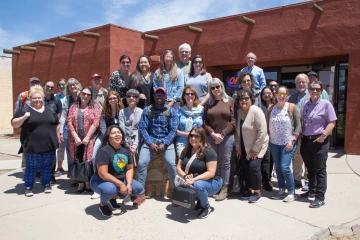AzSORH collects and disseminates rural health information, coordinates rural health activities in the state, provides technical assistance to rural communities and entities providing rural health services including Arizona’s 17 federally designated Critical Access Hospitals (CAHs), 55 Rural Health Clinics (RHCs) of which 32 are CAH-affiliated, 26 community health center systems and their 185 Federally Qualified Health Centers (FQHC) sites, 16 Indian Health Service and 28 Tribal-operated (P.L. 93-638 Self -Determination) clinics and hospitals, county health departments, state agencies – the Arizona Department of Health Services (ADHS), Arizona Health Care Cost Containment System (AHCCCS), the state’s Medicaid and Children’s Health Insurance Program called KidsCare, and private providers, practices, businesses and others.
Make a Difference in Rural & Connect with Your State Office of Rural Health
State Offices of Rural Health (SORHs) are a unique federal-state partnership to help improve the health of rural communities.
What Can a State Office of Rural Health Do for You?
- Connections — Support establishment of connections with key collaborators such as health department programs, academic institutions, non-profit organizations and federal agencies, which can assist you to organize, convene and find resources to improve rural health.
- Information — Help to find and access data on population health, vital statistics (infant mortality, life expectancy, etc.), health access, chronic disease, behavioral health indicators or quality of care to document needs and measure impact.
- Assistance — Assist with community health project ideas, policy solutions and referrals to resources to help ensure quality care, increase access, support workforce initiatives and improve the health of your rural community.
AzSORH collaborates with the National Organization of State Offices of Rural Health, the National Rural Health Association and the Arizona Rural Health Association and other agencies, entities and stakeholders.
AzSORH Contacts
Jennifer Peters
SORH Program Manager
petersjs@arizona.edu
520.626.2254
Bryna Koch, MPH
Assistant Research professor
brynak@arizona.edu
520-626-6253
Mariah Erhart
Community Outreach Professional
merhart@arizona.edu
520.626.2243
Daniel Derksen, MD
AzSORH Principal Investigator & Director, AzCRH
dderksen@arizona.edu
520.626.3085
Quick Links
CRH Newsletters – monthly topics and updates relating to rural health
AzSORH Monthly Webinars – provide technical assistance, research, policy, and best practices on rural health issues in Arizona and nationally. We highly encourage those working in Critical Assess Hospitals, federal qualified health centers and county and state health offices to participate.
» View upcoming and download past webinars
Arizona Rural Health Conference
Rural and Public Health Policy Forum
National Rural Health Day | #powerofrural

Technical Assistance Role
AzSORH builds partnerships and provides technical assistance and resources to address a variety of health needs and build better systems of organized care in rural, border, and tribal Arizona communities. We work closely with a vast statewide and binational network of healthcare organizations, community groups, providers, and local officials across the state.
The AzSORH provides technical assistance on an ongoing basis, including assistance with grant applications, data needs, and evaluation support to a number of organizations interested in developing or refining rural health programs. Through the Arizona Rural Health E-News Briefing, the program sends out funding alerts to potential applicants citing the availability of new funding sources.
Currently, AzSORH is a technical assistance partner in the following active rural health networks:
- Member of Arizona Rural Women’s Health Network serving as board secretary and providing project and grant development TA.
- Member of Santa Cruz County Adolescent Wellness Coalition providing guidance on their network planning process and application for a Rural Health Network Development grant, as well as expertise and resources regarding health literacy, which is a focus of the network.
- Member of Arizona Border Communities Health Network providing guidance on their network planning process and application for a Rural Health Network Development grant, as well as planning and coordinating their efforts to consolidate existing community health needs assessments along the Arizona-Mexico border.
Our Goal
AzSORH’s main goal in community development is to foster capacity building for rural organizations and communities. Though participatory activities, our community partners develop their skill sets, education and training, information acquisition, and decision-making ability on the part of rural organizations, community groups, or individuals/families.
Community development seeks to facilitate the establishment and/or strengthening of the relationship of a health-related organization with its community. When a health organization has a better connection to its community, it can position itself to be responsive. AzSORH strives to support community development that is conducted as an equal partnership between traditional “experts” and members of a community. A community’s participation in its own health system creates new resources, vitality, and synergy for all partners.
Community development can involve many forms and methods such as community needs assessments, strategic planning, decision-making, program planning and evaluation, vision/values/mission development, community forums, and skill training and development.


